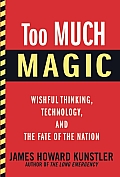We label as "crazy" those members of the human species whose behavior we find hard to understand, but the cascading crises in contemporary political, economic, and cultural life make a bigger question increasingly hard to ignore: Is the species itself crazy? Has the process of evolution in the hominid line produced a species that is both very clever and very crazy?
James Howard Kunstler, Too Much Magic: Wishful Thinking, Technology, and the Fate of the Nation (New York: Atlantic Monthly Press, 2012).
Michael T. Klare, The Race for What's Left: The Global Scramble for the World's Last Resources (New York: Metropolitan, 2012).
Ian Tattersall, Masters of the Planet: The Search for Our Human Origins (New York: Palgrave Macmillan, 2012).
Paleoanthropologist Ian Tattersall ends his recent book about the Masters of the Planet with such reflection:
[A]part from death, the only ironclad rule of human experience has been the Law of Unintended Consequences. Our brains are extraordinary mechanisms, and they have allowed us to accomplish truly amazing things; but we are still only good at anticipating -- or at least of paying attention to -- highly immediate consequences. We are notably bad at assessing risk, especially long-term risk. We believe crazy things, such as that human sacrifice will propitiate the gods, or that people are kidnapped by space aliens, or that endless economic expansion is possible in a finite world, or that if we just ignore climate change we won't have to face its consequences. Or at the very least, we act as if we do (p. 227).
We humans routinely believe crazy things, but are we a crazy species? Does the big brain that allowed us to master the planet have a basic design flaw? Given the depth of the social and ecological crises we face -- or, in some cases, refuse to face -- should we be worried about whether we can slip out of the traps we have created?
Reading Tattersall along with recent books by two thoughtful analysts on resource depletion and ecological degradation, those answers seem quite obvious: yes, on all counts. We're in more trouble than we want to believe, and we are not as well equipped to deal with our troubles as we imagine. But I find some consolation in thinking about our current troubles in the context of our evolutionary history, which can help us understand why the vast majority of people are firmly committed to denying, minimizing, or ignoring the data about our troubles.
A good first step in moving beyond a focus on crazy individuals to the crazy species to which we all belong is the age-old question, "what makes us human?" Tattersall's primary answer is that modern humans are defined by symbolic reasoning:
[F]or all the infinite cultural variety that has marked the long road of human experience, if there is one single thing that above all else unites all human beings today, it is our symbolic capacity: our common ability to organize the world around us into a vocabulary of mental representations that we can recombine in our minds, in an endless variety of new ways (p. xiv).
Tattersall also reminds us that while other animals can be cooperative, modern humans have a unique style of "prosociality" that leads us to care about the welfare of others in a much more expansive fashion than other primates do. Within the human family, we have the capacity for a deeper sense of empathy that is generalizable. We also have a history of eliminating competitive species; Homo sapiens have created a hominid monoculture:
From the very beginning of hominid history, the world had typically supported several different kinds of hominid at one time -- sometimes several of them on the very same landscape. In striking contrast, once behaviorally modern humans had emerged from Africa the world rapidly became a hominid monoculture. This is surely telling us something very important about ourselves: thoughtlessly or otherwise, we are not only entirely intolerant of competition, but uniquely equipped to express and impose that intolerance. It's something we might do well to bear in mind as we continue energetically persecuting our closest surviving relatives into extinction (pp. 197-198).
Our hominid monoculture has of late been fond of other monocultures, particularly in the arenas of agriculture and energy. Large chunks of the modern world are dependent on an increasingly narrow range of plants for food and a dwindling source of concentrated energy from fossil fuels. The two revolutions that have created us so-called civilized moderns -- the agricultural and the industrial revolutions, which are now intimately linked in our dependence on fossil-fuel based industrial agriculture -- are producing some unexpectedly unpleasant and revolutionary consequences. We're running out of the resources on which our mass-consumption "lifestyle" is based, and the production of that lifestyle has unleashed destructive forces we can't contain.
We may not be driving ourselves into extinction, but we are creating conditions that make our future frightening. Our symbolic reasoning capabilities, impressive as they may be, are not yet developed to the point where we can cope with the problems our symbolic reasoning capabilities have created. And, what's worse, those capabilities seem to make it difficult for us collectively to face reality -- call that the delusional revolution, perhaps the scariest revolution of them all. The message transmitted and/or reinforced by the culture's dominant institutions (government, corporations, media, universities) seems to be: (1) it's not as bad as some people think, but; (2) even if it is that bad, we'll invent our way out of the problems, and (3) if we can't invent our way out we'll just pretend the problems aren't really problems. In short: deny, minimize, ignore.
Before dealing with the obvious limitations of that strategy, let's review the reality, starting with Michael Klare's lucid account of The Race for What's Left. Chapter by chapter, Klare methodically demonstrates why his subtitle is not hyperbole; these are, literally, the world's last resources, and the competition for them will only intensify. While resource competition is not new, this stage of the game is without precedent: "The world is entering an era of pervasive, unprecedented resource scarcity" (p. 8). There are no new frontiers to exploit, technology's capacity to extract always-more is limited, and there are now more competitors than the traditional imperial powers. Add to that the implications of global warming and climate disruption, which are not completely known but clearly destabilizing, and Klare's conclusion -- "The race we are on today is the last of its kind we are likely to undertake" -- seems reasonable (p. 18).
The common glib response to this -- "people have long been predicting the end of things, and they've always been wrong" -- is a thin reed on which to lean. Past assessments of resource depletion may have been off a bit on the timing of the draw-down, but they haven't been wrong. Consider this short summary of Klare's survey:
(Note: You can view every article as one long page if you sign up as an Advocate Member, or higher).







